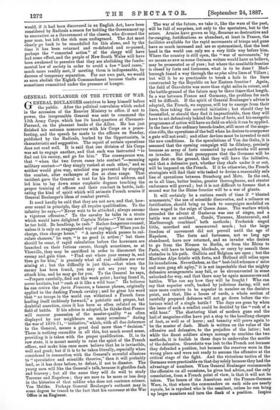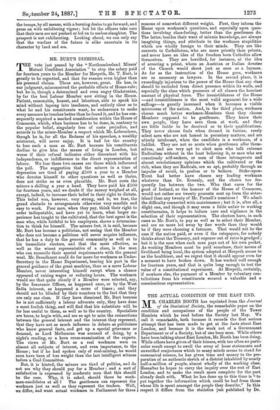GENERAL BOULANGER ON THE FUTURE OF WAR.
GENERAL BOULANGER contrives to keep himself before the public. After the political convulsion which ended in the accession of the Bouvier Ministry to office, if not to power, the irrepressible General was sent to command the
13th Army Corps, which has its head-quarters at Clermont- Ferrand, on the pleasant banks of the Allier. He has just finished his autumn manoeuvres with his Corps on a peace- footing, and the speech he made to the officers on Sunday, published by the Radicals, barked by the Opportunists, is characteristic and suggestive. The report of certain operations does not read well. It is said that one division of his Corps was set to engage another, and that each was instructed "to find out his enemy, and go for him." The consequence was, that " when the two forces came into contact "—meaning military contact—" they simply rushed at each other," and as neither would give way, mischief was prevented by stopping the combat, after exchanges of fire at close range. That incident gave the General a text for his fervid address, and led him to lay down some emphatic dogmas touching the proper training of officers and their conduct in battle, indi- cating the kind of spirit which will animate French armies if General Boulanger's ideas of combat prevail.
It need hardly be said that they are not new, and that, how- ever sound in principle, they all require qualification. To the infantry he says,—"Never wait to be attacked ; always assume a vigorous offensive." To the cavalry he talks in a strain which would have delighted Captain Nolan—" You can never be too bold. Be headlong, be rash." Rather dangerous counsel, unless it is only an exaggerated way of saying,—" When you do charge, then charge home." " A cavalry which pauses to cal- culate chances," he says, "is no good in action ;" but there should be some, if rapid calculation before the horsemen are launched on their furious career, though sometimes, as at Vionville, they may be sacrificed in order to disconcert the enemy and gain time. "Find out where your enemy is, and then go for him," is precisely what all real soldiers are ever aiming at ; but the difficulty is just this,—that when the enemy has been found, you may not see your way to attack him, and he may go for you. To the General he says, —Prepare carefully, find out the weak point ; having found it, never hesitate, but " rush at it like a wild boar." He believes he can revive the furia Francese, a famous phrase, originally applied to the dashing French cavalry ; and he gives his word that "no troops in the world can withstand a French force hurling itself recklessly forward," a patriotic and proper, but doubtful assertion, since it has been so often refuted on the field of battle. If his advice is adopted, he thinks that France will recover possession of the master-quality " so often displayed by our neighbours on many occasions" during the war of 1870-71, " initiative," which, with all due deference to the General, means a great deal more than " decision." There is nothing recondite in all this, but much sound sense, providing it is taken with the proper qualification. If, in its raw state, it is meant merely to raise the spirit of the French officer, and make him once more believe that he is invincible, well and good; but if it is to be taken literally, especially when considered in connection with the General's scornful allusions to "speculative and scientific theories," then it will probably lead, as it has done before, to defeat, if not to disaster. The young men will like the General's talk, because it glorifies dash and bravery ; but all the same they will do well to study Turenne and Napoleon ; they are sure to be more or less deep in the histories of that soldier who does not contemn science, Von Moltke. Perhaps General Boulanger's outburst may in some degree be traced to the fact that his successor at the War Office is an Engineer. The war of the future, we take it, like the wars of the past, will be full of surprises, not only to the spectators, but to the actors. Armies have grown so big, firearms so destructive and far-ranging, fortifications so abundant, at least in France, the facilities available for the rapid movements of troops and guns have so much increased and are so systematised, that the best head in the world can only see a very little way before him. Where the country is still open, the "war of movements," by no means so new as some German writers would have us believe, may be prosecuted as of yore ; but where the assailable frontier is closed by forte and fortresses, what is to be done ? Marl- borough found a way through the ne plus ultra lines of Villars ; but will it be so practicable to break a hole in the lines constructed by the Republic on her Eastern frontier? Again, the field of Gravelotte was more than eight miles in extent, and the battle-ground of the future may be three times that length. In a war between France and Germany, the problem for each will be difficult. If the spirit of General Boulanger's advice is adopted, the French, we suppose, will try to emerge from their lines, thus taking the coveted initiative ; but should they be forestalled, or should they find it impracticable, then they will have to act defensively behind the line of forts, and his energetic programme of action will have no field on which it can be applied. In the face of the ordinary breech-loader, still more of the maga- zine-rifle, the operations of the bull when he desires to overpower a gate will not avail; and other devices must be invented to suit the new conditions. In the speculations of Von der Goltz, it is assumed that the opening campaign will be dilatory, precisely because an array of forts connected by earthworks will arrest an invader. But that presupposes that the Germans will be again first on the ground, that they will have the initiative, and that a defensive part, whether they chafe under it or not, will be imposed on the French. If it be otherwise, the French strategists will find their wits tasked to devise a reasonably safe line of operations between Strasburg and Metz. In the end, as in all time, better brains, greater thoroughness, and stouter endurance will prevail ; but it is not difficult to foresee that a second war for the Rhine frontier will be a war of giants.
It will certainly be a curious result of time if " bloated armaments," the use of scientific discoveries, and a reliance on fortification, should bring us back to campaigns modelled on those waged in the reign of Queen Anne. The warfare which preceded the advent of Gustavus was one of sieges, and a battle was an accident., Conde, Turenne, Montecuculi, and Marlborough combined both methods ; Frederick eieged little, marched and manoeuvred much ; but the large freedom of movement did not prevail until the age of Napoleon. The forts and fortresses, not -so long ago abandoned, have now returned, and an invader who desires to go from the Niemen to Berlin, or from the Rhine to Paris, will have to besiege, blockade, or carry by assault these obstacles in his path. Gallicia and Belgium are open ; but the Maritime Alps bristle with forts, and Holland still relies upon its inundations. Nevertheless, as the" best-laid schemes o' mice and men gang aft agley," it is not improbable that the mighty defensive arrangements may fail, or be circumvented in some unlooked-for way, and that there may be again manoeuvres and battles. Who can say how they will be fought ? Who can say that superior craft, backed by judicious daring, will not once more contrive to be superior in number on the decisive point, and that, like a house of cards, a whole section of carefully prepared defences will not go down before the vic- torious wind of a single battle I The days are gone by when the issue of such a conflict could be decided by the " rush of a wild boar." The shattering blast of modern guns and the hail of magazine-rifles have put a stop to the headlong charges of foot, as well as of horse ; and tenacity will prove again to be the master of dash. Much is written on the value of the offensive and defensive, to the prejudice of the latter ; but while the finest soldiers always manage to combine the two methods, it is foolish in these days to undervalue the merits of the defensive. Gravelotte was lost to the French not because they defended a position, but because the reserves were in the wrong place and were not ready to assume the offensive at the critical stage of the fight. And the victorious tactics of the Germans were practicable on that day solely because they had the advantage of numbers. When General Boulanger recommends the offensive on all occasions, he gives bad advice, and the only consolation, from a French point of view, is that it will not be taken. The lesson of the American and the Franco-German Wars, is, that where the commanders on each aide are nearly equals, he is repulsed who is the assailant, unless he can bring up larger numbers and turn the flank of a position. Inspire the troops, by all means, with a burning desire to go forward, and press on with unfaltering vigour; but let the officers take care that their men are not pushed or led on to useless slaughter. The prospect is not exhilarating. Looking ahead, we can only say that the warfare of the future is alike uncertain in its character by land and sea.



































 Previous page
Previous page